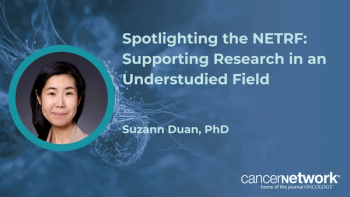
T-DXd Approval Appears Significant in HER2-Low/Ultralow Breast Cancer

Aditya Bardia, MD, MPH, FASCO, spoke about how the FDA approval of T-DXd in HER2-low or ultralow breast cancer will allow for a broader treatment range.
The
CancerNetwork® spoke with Aditya Bardia, MD, MPH, FASCO, about the approval and how the results of the
Bardia, professor in the Department of Medicine, Division of Hematology/Oncology, and Director of Translational Research Integration at the University of California Los Angeles Health Jonsson Comprehensive Cancer Center, discussed the difference between this approval and the
During the interview, Bardia also touched on how this is a broader approval and will help with treating more patients because there is no need to have prior chemotherapy before T-DXd use.
Transcript:
In January 2025, the FDA granted approval to [T-DXd], based on DESTINY-Breast06 for patients with both HER2-low as well as HER2-ultralow, metastatic hormone receptor–positive breast cancer. This was different from [the previous approval] because there was no requirement for prior chemotherapy for the use of T-DXd. Essentially, this could be used in the first-line setting after prior endocrine-based treatment. [Additionally], it’s a broader approval. What does HER2-low and HER2-ultralow mean? Essentially, it refers to the amount of tumor cells that have HER2 expression by [immunohistochemistry]. If it’s less than 10% of tumor cells, that’s called HER2-ultralow, and if it’s more than 10% of tumor cells, that’s HER2-low. It was an operational definition for the trial. As for the approval, you can use T-DXd even in tumors that have very low expression of HER2. In part, it’s probably because of the bystander effect [and] the way the drug works that it has activity even in tumors with very low expression of HER2.
References
- Enhertu approved in the US as first HER2-directed therapy for patients with HER2-low or HER2-ultralow metastatic breast cancer following disease progression after one or more endocrine therapies. News release. FDA. January 27, 2024. Accessed January 27, 2024. https://tinyurl.com/5n8ab8sk
- Curigliano G, Hu X, Dent RA, et al. Trastuzumab deruxtecan (T-DXd) vs physician’s choice of chemotherapy (TPC) in patients (pts) with hormone receptor-positive (HR+), human epidermal growth factor receptor 2 (HER2)-low or HER2-ultralow metastatic breast cancer (mBC) with prior endocrine therapy (ET): primary results from DESTINY-Breast06 (DB-06). J Clin Oncol. 2024;42(suppl 17):LBA1000. doi:10.1200/JCO.2024.42.17_suppl.LBA1000
- FDA approves fam-trastuzumab deruxtecan-nxki for HER2-low breast cancer. News release. FDA. August 5, 2022. Accessed February 6, 2025. https://tinyurl.com/4ysbz27s
- Modi S, Jacot W, Yamashita T, et al. Trastuzumab deruxtecan in previously treated HER2-low advanced breast cancer. N Engl J Med. 2022;387(1):9-20. doi:10.1056/NEJMoa2203690
Newsletter
Stay up to date on recent advances in the multidisciplinary approach to cancer.













































